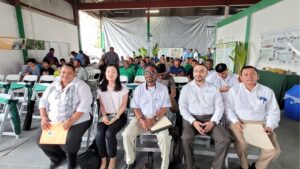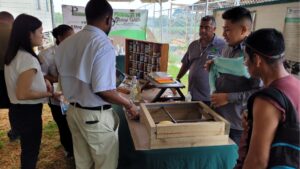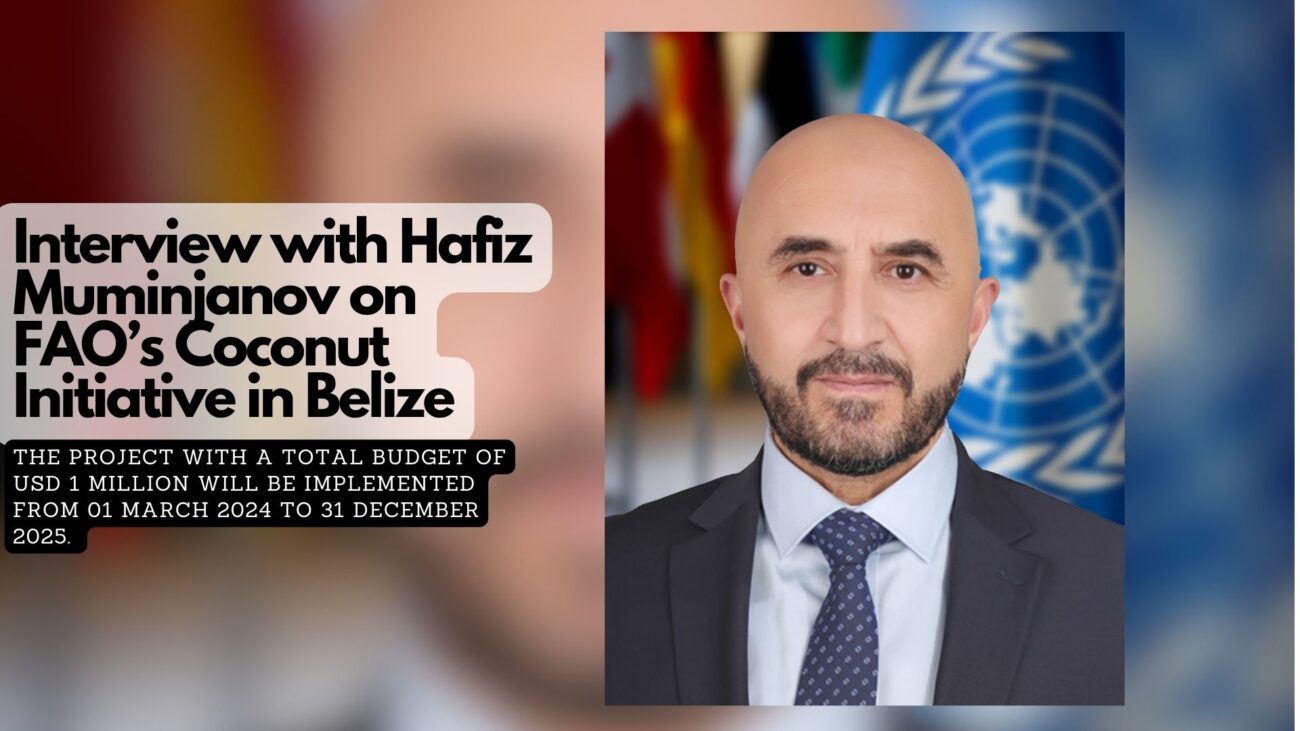Interview with Hafiz Muminjanov on FAO’s Coconut Initiative in Belize
The FAO’s One Country, One Priority Product (OCOP) Initiative has launched its inception workshop to begin a project aimed at enhancing Belize’s coconut value chain. This global initiative will produce a comprehensive value chain analysis and a three-year development plan for Belize’s coconut sector.
The workshop included over 110 stakeholders, discussing project implementation and regional and national priorities for OCOP. To date, around USD 15 million has been mobilized to support 54 countries. In Belize, activities involve creating a national task force and a collaborative work plan with the Ministry of Agriculture, Food Security, and Enterprise.
To get a better understanding of the project, News Five spoke with Hafiz Muminjanov, OCOP Global Coordinator, OCOP Secretariat, Plant Production and Protection Division, FAO.
1. What is the objective of the FAO One Country One Priority Product (OCOP) Initiative?
- FAO has developed the One Country One Priority Product (OCOP) initiative to build more sustainable food value chains of Special Agricultural Products (SAPs), which was globally launched on 7 September 2021. Special Agricultural Products (SAPs) are agricultural products with unique qualities and special characteristics associated with geographical locations, farming practices and cultural heritages. Compared to staple food crops, SAPs have not yet fully benefited from agricultural and rural development programmes.
- The FAO OCOP initiative aims to enhance food security, livelihoods, environmental sustainability, and income generation for rural populations through the sustainable development of SAP’s value chains, from sustainable production to storage, processing and marketing.
- The initiative supports countries in the transition to MORE efficient, inclusive, resilient and sustainable agrifood systems. OCOP is not an initiative that promotes monocropping production systems but focuses on diversification, unlocking the untapped potential of agricultural products, and identifying and addressing gaps in the value chain.
2. How is the OCOP initiative funded, and what is its total budget?
- The implementation of the OCOP initiative started with the formulation of the Global Action Plan and application guidance for the countries and the conducting of a series of training sessions.
- The activities in the field began with the implementation of the global project funded by FAO Flexible Voluntary Contributions (FVC) in 2022, starting in five demonstration countries in five FAO regions – Bangladesh, Egypt, Malawi, Uzbekistan and Trinidad and Tobago. Further funding was received from various sources, including a trust fund project supported by JICA in Ghana, the FAO-China South-South Cooperation (SSC) Programme, FVC, and allocations from the FAO Regular Programme. Regional and national projects funded by the FAO Technical Cooperation Programme (TCP) have also supported the initiative.
As of 1 June 2024, about USD 18 million has been received to support the implementation of OCOP in 60 countries.

National Coconut Stakeholders Seminar and Market Fair 2023
3. Can you name the countries participating in the global project and their selected Special Agricultural Products (SAPs)?
- To date, 85 Members from all five FAO Regions – Africa, Asia and the Pacific, Europe and Central Asia, Latin America and the Caribbean, and the Near East and North Africa – have expressed strong interest in promoting the sustainable development of the value chains of 54 Special Agricultural Products (SAPs), including 28 horticultural and 15 field crops, 6 livestock products and 5 forest products.
- From the Region of Latin America and the Caribbean, 14 countries are promoting 12 SAPS. The countries and SAPs include:
- Bahamas: Poultry
- Belize: Coconut
- Bolivia: Quinoa
- Chile: Honey
- Colombia: Sugarcane
- Ecuador: Cocoa
- Guatemala: Coffee
- Jamaica: Ginger
- Mexico: Amaranth
- Nicaragua: Low-Carbon Livestock Production
- Panama: Coffee
- Peru: Potato
- Trinidad and Tobago: Cocoa
- Bolivarian Republic of Venezuela: Coffee
For more information, please visit the OCOP global website which is in all six official UN languages https://www.fao.org/one-country-one-priority-product/about/special-agricultural-products-(saps)/en
4. How does the OCOP initiative contribute to the development of smallholders and family farms?
- OCOP promotes diverse and integrated food systems, creating sustainable development and market opportunities for small-scale farmers. It places smallholders and family farms at the center of its efforts, using their unique strengths.
- OCOP provides tailored support to countries to strengthen the value chain of their SAPs opening doors to regional and international markets.
5. What are the activities planned for Belize under the regional OCOP, and who are the key partners involved?
- The promotion of OCOP in Belize will be supported in the framework of the new project funded by the FAO Flexible Voluntary Contribution (FVC) mechanism.
- The project with a total budget of USD 1 million will be implemented from 01 March 2024 to 31 December 2025. The project will cover 11 countries from all FAO regions located in the tropics, drylands, mountainous zones as well as the Small Island Developing States.
- This global project aims to expand the implementation of the OCOP initiative on a global scale. .
- In the project framework, Belize will promote coconut as the SAP. The key activities in Belize include establishing OCOP technical networks, capacity development of farmers and stakeholders, conducting the value chain analysis and upgrading national strategy on coconut sector. The project will also establish the mechanism for coordination and communication – such as national task force and will raise awareness among a wide range of stakeholders.
- The OCOP global partners include UNIDO, UNODC, Chinese Academy of Tropical Agricultural Sciences, Chinese Academy of Sciences, etc.
- The key National Taskforce Partners in Belize is likely to include the Ministry of Agriculture Food Security and Enterprise (MAFSE), Caribbean Agriculture Research and Development Institute (CARDI), Sugar Industry Research and Development Institute (SIRDI), University of Belize (UB), International Trade Center (ITC), Financial Institutions, Processors, Exporters, Cooperatives/Associations.

National Coconut Stakeholders Seminar and Market Fair 2023
6. What were some of the highlights discussed during the inception workshop held on April 3, 2024?
- OCOP is inherently country-owned and country-led, tailoring strategies to each country’s specific needs, priorities, and comparative advantages.
- Customizing approaches to fit unique contexts is paramount for effective implementation, focusing on establishing technical networks, enabling environments, and coordination mechanisms.
- Project countries show great potential to promote the synergies between OCOP and other initiatives, programmes and projects at FAO and beyond.
Notably, six project countries are engaged in the FAO Hand-in-Hand Initiative and five in the Digital Village Initiative.
7. How many participants attended the inception workshop, and what was its main purpose?
- Over 110 participants attended the virtual inception workshop of the project, where the project objectives and implementation modalities were discussed, challenges shared and priorities for the OCOP initiative at regional and national levels defined. The overall objective of the project is to improve food security, livelihoods, environmental sustainability, and income for rural populations through the sustainable development of special agricultural product value chains.
8. Can you list some of the challenges and priorities discussed during the workshop regarding the implementation of the OCOP initiative?
This included strengthening financial, technical, and human resources at the global, regional, and country levels; engaging a wide range of stakeholders to support activities at the country and field levels; and monitoring and facilitating OCOP projects.






Facebook Comments